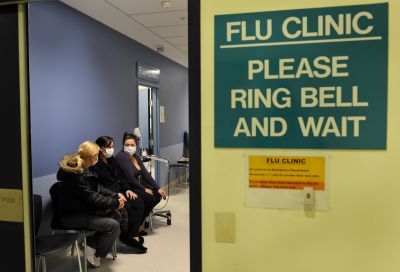Brace to be 'overwhelmed' by swine flu

The northern hemisphere should brace for a tough fight against swine flu, which "overwhelmed" hospitals in the southern hemisphere, a world flu expert said.
Data presented at a three-day meeting of health professionals here showed that "this virus causes severe pneumonia compared to seasonal flu," World Health Organization (WHO) influenza expert Nikki Shindo told reporters.
The influenza A(H1N1) virus, she warned, can cause potentially life-threatening viral pneumonia far more often than the seasonal flu.
"This virus really likes the lower respiratory tract, which means this virus is more likely to cause viral pneumonia than seasonal pneumonia," Shindo warned.
"Of course, we don't have pre-existing immunity. Therefore, we can expect more severe disease and hospitalization during the upcoming influenza season."
Doctors from southern hemisphere countries told the meeting that swine flu had "overwhelmed emergency rooms and especially intensive care units because of the very severe patients who required special care," Shindo said.
Around 30 percent of severe cases had bacterial co-infections, she added, urging that anti-viral treatments be administered in a timely fashion to reduce severe disease.
The antiviral drugs Tamiflu and Relenza have been shown to be effective in treating the novel flu virus, which has killed at least 4,735 people since it was first reported in April in Mexico, according to a WHO tally.
"Clinicians sometimes tend to wait to get laboratory confirmation of H1N1 infection and this causes an unfortunate delay in treatment," said Shindo.
"They have to decide on care based on epidemiological information and patient observation," Shindo said, noting that severe progressive cases in previously healthy adults tend to deteriorate from the third day of the onset of illness.
The Washington meeting gathered scores of pathologists, virologists, clinicians and experts who shared data as they tried to better understand the swine flu in order to "prevent overwhelming mortality and severe disease," Shindo said.
kdz/oh
Join our commenting forum
Join thought-provoking conversations, follow other Independent readers and see their replies
Comments
Bookmark popover
Removed from bookmarks